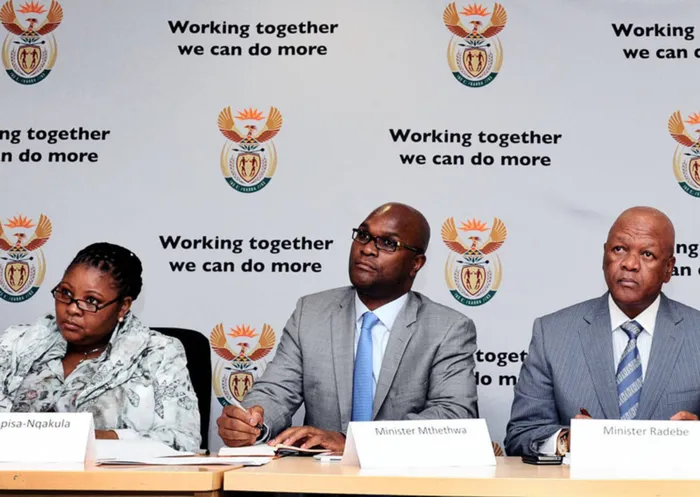New board to parole only the gravely ill

Justice, Crime Prevention and Security Cluster lead by Justice and Constitutional Development Minister Jeff Radebe, joined by Minister Nosiviwe Mapisa-Nqakula of Correctional services, Minister of Police Nathi Mthethwa, Minister of Home Affairs Nkosazana Dlamini Zuma and Deputy Minister of Justice and Constitutional Development Andries Nel at a media briefing in Pretoria. Justice, Crime Prevention and Security Cluster lead by Justice and Constitutional Development Minister Jeff Radebe, joined by Minister Nosiviwe Mapisa-Nqakula of Correctional services, Minister of Police Nathi Mthethwa, Minister of Home Affairs Nkosazana Dlamini Zuma and Deputy Minister of Justice and Constitutional Development Andries Nel at a media briefing in Pretoria.
A new “independent” medical parole advisory board will be set up to ensure that only SA’s very sick of sick inmates are paroled.
In terms of the new Correctional Matters Amendment Act a doctor will now be required to thoroughly motivate why a prisoner should be considered for medical parole.
While the department denies a floodgate of applications will open, the move is expected to see parole applications such as that of former police commissioner Jackie Selebi that was denied being brought up again – this time before the new board.
The announcement of the board, and a multimillion rand electronic parolee tagging pilot project, was made in Pretoria on Sunday at the government’s justice, crime prevention and safety cluster.
The new board will come into effect on March 1, Justice Minister Jeff Radebe said. Its mandate will be to look into all seriously and terminally ill inmates who have submitted reports requesting release on medical grounds.
Dismissing any possible challenges, Correctional Services Minister Nosiviwe Mapisa-Nqakula said the board would ensure that only those who were truly sick would be granted parole.
“Only the very sick will be freed. If you have HIV and a low CD4 count or TB you can still be given medicines to improve your health inside prison. That means you stay inside,” she said.
The board will be chaired by Dr Victor Ramathesele and Dr Angelique Coetzee and will make the final decision on whether an inmate is granted medical parole or not, Mapisa-Nqakula said.
“We don’t anticipate any challenges and have all necessary legislation in place to ensure the system functions smoothly.
“The board will meet this week to develop the necessary framework to deal with the matters presented.”
The current situation required that a new system be established and that it had to act independently, she said.
“The difference this time is that the board will study reports and interact with prison doctors, inmates and prison officials before recommendations are made.
“No decision is going to be made without it going through this independent board,” she said.
Inmates suffering from the “sniffles” and other flu-like symptoms, would not qualify for medical parole, Mapisa-Nqakula said.
And no “opening of floodgates” was expected when it came to applications for medical parole.
“This is only for the very sick of the sick. The board will also have to ensure that if inmates are granted parole they do not pose a risk to society.”
Asked about the type of ailments which could see people being granted medical parole, Mapisa-Nqakula, said:
“We are going to take this case by case. We have prisoners who have been crippled by diseases, with many inmates wasting away.
“At this stage we cannot predict how many will apply for medical parole or who will be granted this form of parole,” she said.
Under the new structure, a member of the public, an inmate or a family member could initiate the process of seeking medical parole.
“The Selebi case was a case in point. That request, made by a group calling itself Friends of Jackie Selebi, could not be accepted under the current legislation.
“I responded to that application in terms of current law. That application can now be made under a new framework in March,” she said.
Addressing overcrowding in prisons, Mapisa-Nqakula said the new initiative of electronic monitoring would have parolees being tagged with special devices.
“The year-long R6 million project will target 150 inmates of whom 70 are lifers now on parole.
“The movements of parolees will be monitored from a national centre. The project is aimed at addressing overcrowding in prisons and to ensure parole conditions are not violated.
“It will ensure that parolees can move around to enable them to be able to integrate properly in society by applying for jobs,” she said. - Pretoria News